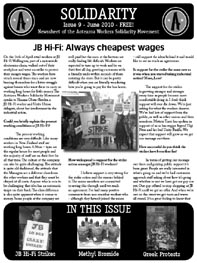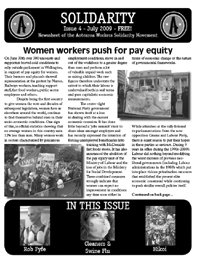Yet another university essay. Footnotes aren’t in this post, so if anyone wants to know where something is from either work it out yourselves from the bibliography at the bottom, or ask in a comment 
Anarchist-Communism and Mutual Aid: The revolutionary thought of Peter Kropotkin
Peter Kropotkin combined a lifelong passion for revolutionary working class politics with scientific work in the fields of geography, zoology and evolutionary biology. In the field of politics, he is known as one of the founding figures of the anarchist-communist school of thought, while in evolutionary science his theory of mutual aid as a factor in evolution continues to wield influence today. While Kropotkin engaged in both the political and the scientific arenas, the two mostly remained separate – other anarchists of the time paid far more attention to his political works such as The Conquest of Bread and Field, Factories and Workshops than they did his scientific works like Mutual Aid: A Factor of Evolution. Likewise, Kropotkin’s fellow scientists predominantly did not adopt anarchist-communist politics. This essay will examine the history of anarchist-communist politics and of the concept of mutual aid, and discuss some areas where they overlap and the theory of mutual aid can be used to support anarchist-communism.
Kropotkin and the development of anarchist-communism
Anarchist-communist politics stress “egalitarianism and the abolition of social hierarchy and class distinctions that arise from unequal wealth distribution, the abolition of capitalism and money, and the collective production and distribution of wealth by means of voluntary associations”.1 The anarchist-communist Aotearoa Workers Solidarity Movement defines an anarchist-communist society as one where “society would be run by a federation of workplace and community councils, with everyone having a say in decisions that affect them. Resources and property would be communally owned and controlled by everyone. Production would be geared to satisfying everyone’s needs, people would give voluntarily according to their ability, and produce would be distributed freely according to need.”2 Along with figures such as the Frenchman Joseph Déjacque and Italians Carlo Cafiero and Errico Malatesta, Kropotkin was an important early theorist of anarchist-communism.
Prior to the rise of anarchist-communism, the dominant strain of thought amongst anarchists was collectivist anarchism, based primarily on the work of theorists and activists such as Mikhail Bakunin and James Guillaume. Anarchist-communism primarily differed with collectivist anarchism over the issue of money in a post revolutionary society. While both collectivists and communists support the socialisation of the means of production, collectivists “express[es] a state of things in which all necessaries for production are owned in common by the labour groups and the free communes, while the ways of retribution [i.e. distribution] of labour, communist or otherwise, would be settled by each group for itself.”3 Iain McKay notes that
while communism and collectivism both organise production in common via producers’ associations, they differ in how the goods produced will be distributed. Communism is based on free consumption of all while collectivism is more likely to be based on the distribution of goods according to the labour contributed. However, most anarcho-collectivists think that, over time, as productivity increases and the sense of community becomes stronger, money will disappear. Both agree that, in the end, society would be run along the lines suggested by the communist maxim: “From each according to their abilities, to each according to their needs.” They just disagree on how quickly this will come about.4
Anarchist-communists such as Kropotkin saw collectivist anarchism as fundamentally flawed. In What Is Anarchism?, Alexander Berkman noted that anarchist collectivism “begins by abolishing private ownership of the means of production and immediately reverses itself by returning to the system of remuneration according to work performed which means the re-introduction of inequality.”5 In contrast, “The abolition of wage labour is central to anarchist communism … Anarchist communists argue that there is no valid way of measuring the value of any one person’s economic contributions because all wealth is a collective product of current and preceding generations.”6 Anarchist-communism, therefore, can surmised as boiling down to one simple concept: from each according to their ability, to each according to their need. From there, all that stands in the way (the state, capitalism, racism, sexism etc.) must be opposed.
Kropotkin’s major works on anarchist-communism are The Conquest of Bread, a collection of essays first published in French in two anarchist journals that Kropotkin edited, and Fields, Factories and Workshops: or Industry Combined with Agriculture and Brain Work with Manual Work, also a collection of essays. The Conquest of Bread consists of a series of arguments against capitalism and the state, and for anarchist-communism. In it, Kropotkin states that a tendency towards anarchism exists in all societies, noting that “Thus we find a tendency, eminently communistic, springing up on all sides, and in various guises, in the very heart of theoretically individualist societies.”7 Fields, Factories and Workshops, meanwhile, is a hypothetical examination of some of the ways in which an anarchist-communist society might organise itself, and its production and distribution. Kropotkin argues that scientific progress has given the working class and peasantry glimpses of possibility of a better future, and that these victories “been won by the obscure tillers of the soil, from whose hands greedy States, land lords and middlemen snatch the fruit of their labour even before it is ripe; by obscure teachers who only too often fall crushed under the weight of Church, State, commercial competition, inertia of mind and prejudice.”8
Mutual aid and evolution
Peter Kropotkin based his book Mutual Aid: A Factor of Evolution on his studies of wildlife in Eastern Siberia and Northern Manchuria. While there, he noticed that
even in those few spots where animal life teemed in abundance, I failed to find — although I was eagerly looking for it — that bitter struggle for the means of existence, among animals belonging to the same species, which was considered by most Darwinists (though not always by Darwin himself) as the dominant characteristic of struggle for life, and the main factor of evolution.9
Kropotkin was not the first to suggest that mutual aid amongst animals was a contributing factor to the evolutionary process. Mutual aid was, in the 19th century, a relatively common position amongst Russian naturalists, including Nikolai D. Nozhin, who “argued that intraspecific relations were normally characterised, not by competition, but by mutual aid.”10
Iain McKay notes that Kropotkin’s work was aimed at “rebutting the misuse of evolutionary theory to justify the status quo, but its synthesis of zoological, anthropological, historical and sociological data achieved far more and, consequently, its influence is great.”11 That the book had great influence is further reinforced by Lee Alan Dugatkin, Professor of Evolutionary Biology at the University of Louisville, who writes that “[i]t is arguable that of all the books on co-operation written by biologists, Kropotkin’s Mutual Aid had the most profound affect on biologists, social scientists, and laymen alike.”12
Amongst many biologists, Kropotkin’s ideas still hold sway today. Stephen J Gould, the noted evolutionary biologist and science historian, states that he “would hold that Kropotkin’s basic argument is correct. Struggle does occur in many modes, and some lead to cooperation among members of a species as the best pathway to advantage for individuals. If Kropotkin overemphasized mutual aid, most Darwinians in Western Europe had exaggerated competition just as strongly.”13
Mutual aid and anarchism
While Mutual Aid was not as widely read amongst anarchists as his political work, Kropotkin believed that his scientific work gave a powerful basis to his political work. Anarchists have used the term mutual aid to describe the social relations they wish to see replace capitalism, for example:
Mutual aid is a term used to describe interactions based on cooperation rather than competition. Under capitalism, we are compelled to compete with each other to survive – for jobs, for property and for friendships. While capitalism demands we ask why we should help someone, mutual aid encourages us to ask why not.14
In line with his anarchism, Kropotkin believed that mutual aid could not exist between classes. He asked rhetorically “[w]hat solidarity can exist between the capitalist and the worker he exploits? Between the head of an army and the soldier? Between the governing and the governed?”15 McKay argues that Mutual Aid is still an important work for anarchists as “many of the justifications for capitalism (on the right) and for state intervention (on the left) retain some traces of the old Social Darwinian rationale he combated in the 19th century. “16
Conclusion
Kropotkin’s work on political theory played a key role in the development of the mass anarchist-communist movement of the late 1800s and early 1900s. His position amongst anarchists may be unparalleled, with Bakunin being the only possible exception. Likewise, his scientific work on mutual aid is still seen as important, and while it is often minimised by those who talk of Darwin’s theories, Kropotkin’s work is undoubtedly still an influence on modern evolutionary biologists. While Mutual Aid did not necessarily influence anarchist theory, it provided it with a further scientific backing, perhaps increasing its legitimacy in the eyes of some.
Bibliography
Anarchist Federation, ‘Anarchist communism – an introduction’, http://libcom.org/thought/anarchist-communism-an-introduction (28 September 2009).
Aotearoa Workers Solidarity Movement, ‘Aims & Principles’, 2009, http://awsm.org.nz/? page_id=14 (28 September 2009).
Aotearoa Workers Solidarity Movement, An Anarchist-Communist Reader (Wellington: Aotearoa Workers Solidarity Movement, 2008), p. 5.
Berkman, Alexander, What Is Anarchism? (Oakland: AK Press, 2003), p.230.
Dugatkin, Lee Alan, Cooperation Among Animals: An Evolutionary Perspective (Oxford: Oxford University Press, 1997), p. 8.
Gould, Stephen Jay, ‘Kropotkin was no crackpot’, 1997, http://libcom.org/library/kropotkin-was-no-crackpot (28 September 2009).
Kropotkin, Peter, ‘Fields, Factories and Workshops: or Industry Combined with Agriculture and Brain Work with Manual Work: Chapter 9: Conclusion’, 1912, http://dwardmac.pitzer.edu/anarchist_archives/kropotkin/fieldsch9.html (28 September 2009).
Peter Kropotkin, ‘Mutual Aid: A Factor of Evolution: Introduction’, 1902, http://dwardmac.pitzer.edu/Anarchist_Archives/kropotkin/mutaidintro.html (28 September 2009).
Kropotkin, Peter, ‘The Conquest of Bread: Chapter III – Anarchist Communism’, 1906, http://libcom.org/library/conquestofbread1906peterkropotkin3 (28 September 2009).
Kropotkin, Peter, Words Of A Rebel (Ottawa: Black Rose Books, 1996), p. 30.
McKay, Iain, An Anarchist FAQ: Volume 1 (Oakland: AK Press, 2009), p. 64.
McKay, Iain, ‘Mutual Aid: An Introduction and Evaluation’, 2008, http://anarchism.pageabode.com/anarcho/mutual-aid-an-introduction-and- evaluation (28 September 2009).




 Posted by Asher
Posted by Asher 


 Download issue in .pdf format
Download issue in .pdf format Download issue in .pdf format
Download issue in .pdf format
